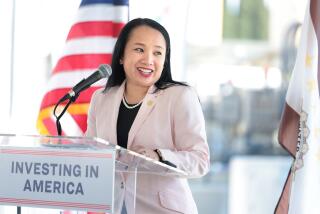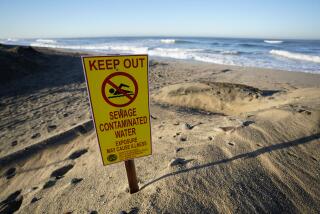Firm Seeks Partners to Finance Irwindale Trash-Energy Plant
- Share via
A company that has spent $10 million trying to win permits to build a controversial waste incineration plant in Irwindale is seeking $5 million in additional financing for the project through a joint venture partnership.
John McGrain, president of Conversion Industries, whose subsidiary, Pacific Waste Management Corp., is seeking to build the Irwindale plant, said partnership negotiations are under way with three companies.
McGrain refused to identify the companies but said one is in the waste-to-energy field and another is an engineering design firm.
Predicts Agreement
He said he is “99.9% sure” that an agreement can be negotiated despite Pacific Waste’s difficulties in trying to win approval from the state Energy Commission to build the plant. The commission suspended Pacific Waste’s application last April because of its failure to meet air pollution requirements. An Energy Commission panel is due to rule soon on whether the application should be terminated. That ruling could be appealed to the full commission.
The licensing effort is stalled over state and federal regulations that allow pollution-emitting plants, such as the proposed Irwindale trash incinerator, to be built only if the developers offset the pollution by obtaining offset credits.
The regulations set up a system of trade-offs in which the developers can offset the pollution the new plant will emit by reducing pollution from existing plants. Offset credits can be earned in two ways: by equipping existing plants with new anti-pollution devices or by purchasing emission credits from plants that are no longer in operation or have shut down polluting equipment.
Lined Up Credits
McGrain said Pacific Waste has lined up $12.5 million worth of offset credits, but the South Coast Air Quality Management District says the company still falls short of offsets in at least three categories of pollutants. Pacific Waste claims that this analysis is flawed and contends that it has submitted sufficient offsets to revive its application before the Energy Commission.
McGrain said that of the $5 million being sought in additional financing, more than $4 million would be used to buy offset credits. The remainder would be used to pay attorneys, engineering consultants and others hired to help with the application process.
The Irwindale Resource Recovery Authority sold $395 million worth of bonds in 1984 to help Pacific Waste finance construction of the waste-to-energy plant. The construction money cannot be touched until permits to build the plant have been issued, but the bond issue was structured so that in 18 months it generated more than $13 million in arbitrage--the difference between what bond investors were paid in tax-free income and what reinvestment of the bond proceeds earned.
Neither Pacific Waste nor the bond trustee has been willing to provide a detailed statement of how the $13 million has been spent. But McGrain said about $5 million went toward expenses incurred in issuing the bonds and $8 million has gone toward legal fees, engineering studies and other work to secure permits to build the plant.
Licensing Process Lengthy
When the bonds were issued, Pacific Waste expected to start building the plant in 18 months and then tie repayment of the bonds to the plant’s revenue. But the licensing process has been lengthy and complicated, made difficult by strong opposition from neighboring cities and residents.
Meanwhile, the bonds have been remarketed on a short-term basis, with the proceeds invested in certificates of deposit, but the arbitrage that is being generated now only pays the financing expenses, McGrain said.
Conversion Industries, through its Pacific Waste subsidiary, has spent $2 million of its own money on the Irwindale project, in addition to the $8 million from the arbitrage, bringing total expenditures to about $10 million, McGrain said.
Sold Share in Cash Flow
Conversion sold a 2% interest in anticipated cash flow from the Irwindale plant for $700,000 in 1985 to Centerra Development Inc. Centerra is the parent company of HDR Techserv, which has been paid $2 million to manage the effort to obtain permits for the Irwindale plant. Centerra once held an option to acquire an additional 6% interest in the project for $2.1 million, but did not exercise it.
McGrain said he expects to obtain new financing under an arrangement similar to that with Centerra, selling anticipated cash receipts to create the joint venture partnership.
He said Conversion always intended to seek partners in the Irwindale project.
But, he said, he had hoped to wait until the project was further along so that investors would be willing to pay a higher price.
More to Read
Inside the business of entertainment
The Wide Shot brings you news, analysis and insights on everything from streaming wars to production — and what it all means for the future.
You may occasionally receive promotional content from the Los Angeles Times.










